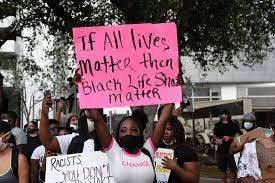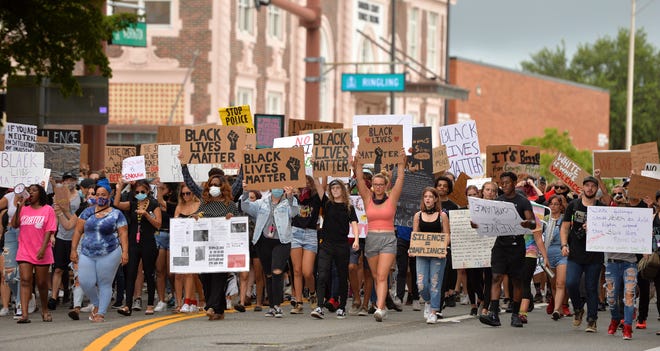John Kennedy, Capital Bureau
USA TODAY NETWORK-FLORIDA

TALLAHASSEE – Gov. Ron DeSantis’ “anti-riot” bill, which has become one of the Legislature’s most controversial measures, finally advanced Friday in the state Senate.
Dozens of Floridians testified against the legislation, with many condemning it as a racially tinged attack on free speech. Republican legislators who spoke in favor of the measure echoed DeSantis’ stance that it’s needed to protect businesses and communities from violence.
The governor proposed the legislation following the Black Lives Matter protests last year that followed the killing of George Floyd by Minneapolis police. Some of the demonstrations around the nation turned violent, with stores burned and looted, while protesters and police were injured in confrontations.
“I believe those rioters took away from what those peaceful protesters were trying to change,” said Sen. Danny Burgess, R-Zephyrhills, Senate sponsor of the measure, which already cleared the House on party lines.
Previously: DeSantis-backed ‘anti-riot’ bill clears Florida House following hours of tense debate
More from the state legislature:After drawing heat, Republican leaders boost housing money — but still take most of it
The legislation (HB1) toughens penalties for crimes that occur during protests that turn violent and creates new crimes including “mob intimidation,” “inciting a riot,” and “defacing, damaging or destroying a monument,” largely aimed at protecting Confederate statutes across Florida that are occasional targets of protests.
Senate Democrats, who unsuccessfully tried to water down the legislation with amendments beaten back by ruling Republicans on the Appropriations Committee, said the proposal is not needed – and likely unconstitutional.
“This language is so broadly worded, so badly defined, so potentially harmful to the right of free speech that, you know, you could have peaceful protesters prosecuted simply for being present while someone near them ... breaks the law,” said Senate Democratic Leader Gary Farmer of Lighthouse Point.
Floridians who traveled to Tallahassee to testify remotely blocks away from the Capitol blistered the legislation and warned that the criminal sanctions are certain to be applied more rigorously against Black protesters.
The Rev. James T. Golden, a minister and member of the Manatee County School Board, said the approach reflected the state’s Republican-dominated government seeking to quash criticism.
“This is not about race. This is about power,” Golden told the committee.
Along with the tougher criminal penalties, city and county governments could be held financially liable for damages if they failed to control protests that get out of hand. They also could be subject to new challenges if they attempt to reduce spending on law enforcement.
“This punitive and political preemption is not how democracy works,” said Sabrina Javellana, a Hallandale Beach city commissioner, urging lawmakers to kill the legislation.

Republican leaders unveiled the anti-riot measure the evening of Jan. 6, when a pro-President Trump mob overran the U.S. Capitol. But DeSantis talked about taking the steps contained in the bill as early as September – when the Black Lives Matter protests were still fresh.
“This is a very robust package,” DeSantis said when he outlined tougher penalties against protesters, most of which are contained in HB 1. “I think what it’s saying is we are not going to let Florida go down the road that some of these other places have gone.”
Among the provisions in the package approved Friday is a mandatory six-month sentence for anyone convicted of battery on a police officer during a riot. Another would impose a felony carrying penalties ranging from a $5,000 fine to 10 years in prison for anyone convicted of injuring someone or damaging property during a “violent public disturbance” involving three or more people.
Those arrested as part of a riot would be unable to immediately bond out and would have to wait for a first appearance before a judge.
While the legislation was an early priority for the House, which approved the bill two weeks ago, Friday’s hearing was its debut in the Florida Senate. The delay was viewed by some as a sign senators had problems with at least a few of the provisions. But the governor’s priority bill now looks set for a final vote well ahead of the Legislature’s scheduled April 30 finish.
No comments:
Post a Comment